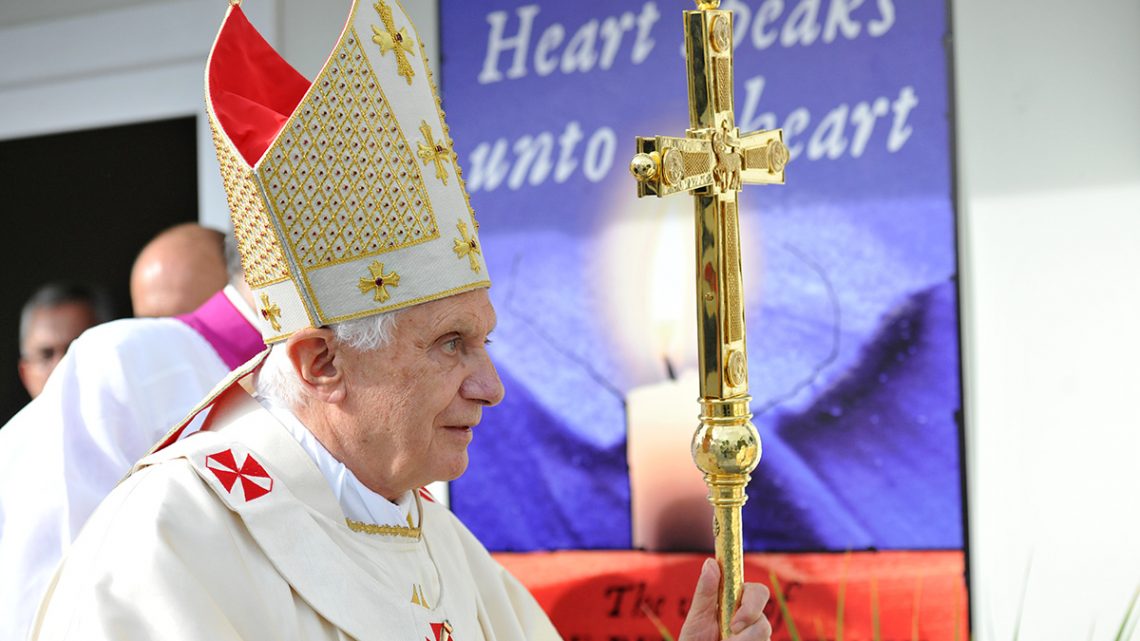Why beatify Newman and what is his 'saintly' contribution to the Catholic Church and her teachings?

In common with other beatified or canonised men and women, Newman had a profound prayer life, a generous attitude to accepting sacrifice and a genuine and practical love for the poor. But above all these, Newman’s holiness was special in that it was a sanctity of mind: his love for God and the world expressed itself intellectually.
Newman manifests exceptional intellectual gifts brought wholly into the service of exploring and defending Christian Truth. Doing this as Newman did it demands deep purification of the mind: for doubtless Newman’s mind, like everyone’s, was by nature a place of egoism, fantasy and disobedience.
People sometimes say that Catholic Faith, in particular, imposes a kind of mental slavery. Newman’s example suggests a different conclusion. His capacity for understanding the human condition – he would have made a great psychologist – expanded and deepened as his mind focussed upon the reality of God.
Even some Catholics think that intellectual freedom means maintaining a critical distance from the Church’s teaching. Again, Newman shows another way. By embracing Catholic Faith and morals, his mind both grew deeper and was made holy.
For this reason Newman’s theology, and articulation of the shape and meaning of the Christian life, especially in his sermons, retain contemporary power. They are not merely the writings of a holy man; they are Newman’s holiness in action.
Pope Benedict XVI (as Cardinal Ratzinger) spoke of this aspect of Newman’s significance: ‘The characteristic of the great doctor [i.e teacher] of the Church…is that he teaches not only through his thought and speech, but rather by his life, because within him thought and life are interpenetrated and defined. If this is so, then Newman belongs to the great teachers of the Church, because at the same time he touches our hearts and enlightens our thinking.’
The Pope has a life-long devotion to Newman. He has told us why: ‘Truth is the central thought of Newman’s intellectual grappling.’
His passion for truth, at any cost, underlies Newman’s sanctity of mind. This passion shaped the great events of his life: teenage conversion to God in 1816, advocacy of renewal in the Church of England during the 1830s, and above all his conversion to Roman Catholicism in 1845.
In Newman’s own estimation, the question of truth was the heart of his life. When made a Cardinal in 1879, the address he gave focussed on one thing: his life-long opposition to ‘liberalism in religion…the doctrine that there is no positive truth in religion, but that one creed is as good as another.‘ The same focus is apparent in Benedict XVI’s address to the Catholic Bishops of England and Wales during their recent visit to Rome: ‘Fidelity to the Gospel in no way restricts the freedom of others – on the contrary it serves their freedom by offering them the truth.‘
Newman would refuse any suggestion that the Church must be reduced to a mere ‘interest group’, addressing only Catholics and compromising with the State, and with public opinion, out of respect for ‘democracy’. No one knew better than Newman that people cannot be forced to accept the truth. But he also believed they are entitled to have the truth proclaimed: to learn from (and perhaps even be converted by) the example of the Church’s witness.
In his address to the Bishops, Pope Benedict insisted that in ‘a social milieu that encourages the expression of a variety of opinions on every question that arises’, the Church must act from the conviction that it is ‘the truth revealed through Scripture and Tradition and articulated by the Church’s magisterium that sets us free.’
And he went on: ‘Cardinal Newman realized this, and he left us an outstanding example of faithfulness to revealed truth… Great writers and communicators of his stature are needed in the Church today, and it is my hope that devotion to him will inspire many to follow in his footsteps.‘
This means renewing the ‘testimony of conscience’ of which Newman is perhaps the deepest and most eloquent exponent. Newman’s life and work, the Pope has said, ‘could be described as a single great commentary on the question of conscience.‘
Newman’s conviction is that the light of conscience, a natural endowment disfigured by personal sin and the sins of society, must in our own time be retrieved and re-embraced. Only then can our minds’ relentless attraction to error be healed and overcome. For Newman, as for Pope Benedict, the Catholic Church shows herself as the authentic guardian of conscience, its true peace and security. Like Newman, Pope Benedict (so aware of Nazi and Stalinist barbarity) points to the chaos that lies, unavoidably, along the road upon which conscience is overthrown; and to Christ and His Church as, alone, able to turn us back.
Newman knew that this truth is ultimately uncontainable by the apparently well-ordered, but often seductive and morally ambiguous, procedures of secular politics. The significance of his Beatification lies in this realisation. As Pope Benedict has said in reflecting on Newman’s meaning: ‘A man of conscience is one who never acquires tolerance, well-being, success, public standing, and approval on the part of prevailing opinion, at the expense of truth.‘